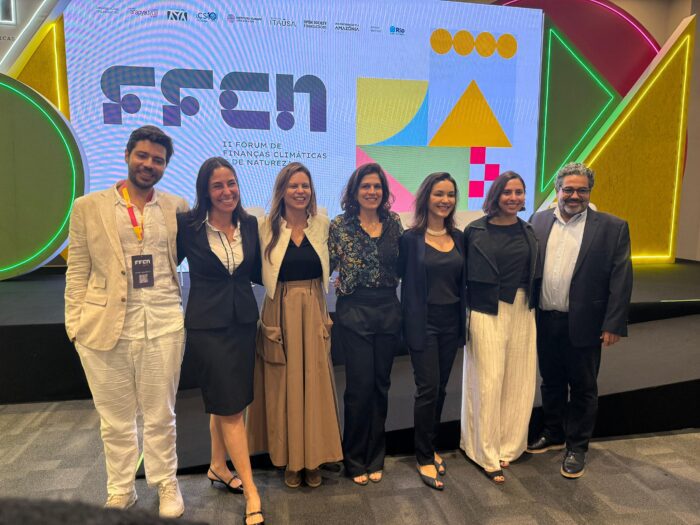
The 2nd Climate and Nature Finance Forum brought together experts, philanthropy, market, and political authorities to discuss the relationship between economic growth and environmental preservation. Credit: Collection
Connecting climate, nature, and financial capital. That was the main objective of the 2nd Climate and Nature Finance Forum, which took place in Rio de Janeiro on May 26 and 27, and brought together various actors from philanthropy, private capital market, and political authorities, including the COP30 summit. Organized by Instituto Arapyaú, Instituto AYA, Instituto Clima e Sociedade (iCS), Instituto Igarapé, Instituto Itaúsa, Open Society Foundations, and Uma Concertação pela Amazônia, the event had as its central axis the relationship between environmental preservation and economic growth, with a focus on the impact of ecosystems on the global economy and public policies.
Ana Toni, director of COP30, which will take place in November in Belém (PA), took the opportunity to reinforce that Brazil has been mobilizing diplomatic and political efforts to ensure resources commensurate with the challenges of decarbonization. She once again demanded responsibility from the richest countries: “Achieving a greater flow of financing from developed countries to developing countries is not a good deed, kindness, charity. The interest in mobilizing up to 1.3 trillion dollars for developing countries should come from developed countries, which are not releasing these resources.”
One of the main focuses of the Brazilian presidency at the Climate Conference is the articulation of a strategic plan to enable the mobilization of this capital (US$1.3 trillion per year by 2035), with the aim of supporting developing countries in transitioning to a low-carbon economy. COP 29, held in Baku (Azerbaijan), approved a commitment of US$300 billion annually from 2035 onwards — a significantly lower amount — but Brazil advocates for greater ambition in climate financing.
Renata Piazzon, general director of Arapyaú, pointed out that global philanthropy allocates US$10 billion annually for climate financing, but only US$100 million reaches the national ground. “It is urgent that we accelerate the mobilization of resources and, more than that, ensure that they reach the necessary places,” she said during the panel “Financing Challenges: What to Expect from COP30”.
“The Belém COP must be an implementation COP, we have to look at existing projects, foster them, and, with good results, attract more investment to initiatives like these. In Brazil, we have the widest range of nature-based technologies and solutions and we have scale,” emphasized Dan Ioschpe, High Level Climate Champion, who participated in the same debate.
Marcele Oliveira, Youth Climate Champion, argued that discussions on climate financing should also include combating environmental racism and promoting climate justice, expanding the diversity of voices in these agendas. “When indigenous, riverside, and traditional youth come to participate in the climate debate, they are met with a narrative of the end of the world, but discussions on financing point forward, to what we are going to do. It is necessary to invite these youths to sit at the table and help build this horizon. Climate financing must be transparent, equitable, participatory, and engage with young people,” she argued.
According to Marcele, the first COP to be held in the Amazon is an opportunity to value socio-biodiversity in climate and nature agendas and boost investments in climate education, something aligned with the expectations of André Corrêa do Lago, president of the conference in Belém. “We want this COP to show solutions to turn commitments into results,” said the ambassador, noting that the member countries of the United Nations Framework Convention on Climate Change (UNFCC) sign documents, but often this does not translate into action.